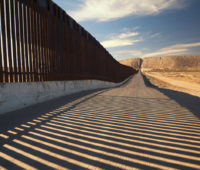Public perceptions of immigrants and crime This essay originally appeared as a special report for the Immigration Policy Center, a division of the American Immigration Law Foundation. It is printed here with the permission of the IPC and the AILF. Myths and stereotypes about immigrants and crime often provide the underpinnings for public policies and […]
While debates over illegal workers, border controls, employer sanctions, access to services, amnesty, temporary workers, and the like have persisted at least since the formation of the Select Commission on Immigration and Refugee Policy in 1979, the positions taken by advocates and the policies proposed by politicians have recently become more contentious and extreme.
In the coming months, reconciling divergent views in the House and Senate on these issues in legislation will be difficult, if not impossible. The Bush administration’s Border Security Initiative would deploy new military technologies, 370 miles of fence, 6,000 National Guard, and 15,000 new Border Patrol officers. While many Senators insist on amnesty-like “pathways to citizenship” for most of the estimated 11-12 million undocumented immigrants, the majority in the House would block access to permanent residency and impose felony charges for illegal entry. Up for renewed scrutiny are restrictions on immigrants’ access to health, education, and social services, and high-tech identification cards for all Americans. And more.
In unprecedented public response, hundreds of thousands of undocumented and legal immigrants have joined protest marches in cities across the country, culminating in the May 1st “Day without Immigrants.” Private militias are patrolling the border to make up for federal, state, and local governments’ “chaotic neglect” of border enforcement. And in national newspaper ads the Mexican government is claiming “shared responsibility” for U.S. policies and is publicly protesting to President Bush about his plans.
What sense can be made of the forces that are driving these conflicting stances and tumultuous activities? In “Border Battles: U.S. Immigration Debates” you can find original insights from social scientists on the key underlying issues.
Labour Market Flooding? Migrant Destination and Wage Change during America’s Age of Mass Migration
by Susan B. Carter, Richard Sutch and Items AdminInfluential voices in the media and in public policy circles have sustained the impression and perhaps heightened the concern that high levels of immigration harm resident Americans by reducing their wages. This perception of “labour market flooding” – sometimes billed as “common sense” (Brimelow, 1995) – is bolstered by the logic of introductory-level microeconomic theory. […]
The United States and Mexico: Prospects for a Bilateral Migration Policy
by Marc R. Rosenblum and Items AdminOn July 2, 2000, Vicente Fox became Mexico’s first democratically-elected opposition president, and almost made good on a campaign promise to re-examine US-Mexican migration relations by proposing that the countries of North America begin eliminating controls on regional labor flows. The idea of a common market fell on deaf ears within the United States, but […]
Do Surges in Less-Skilled Immigration Have Important Wage Effects?
by David R. Howell and Items AdminOver the last three decades the U.S. has experienced a second great surge in immigration, comparable in many respects to the massive increase in foreign born workers in the Age of Mass Migration – the decades around the start of the last century. Between 1970 and 2005 the foreign-born share of the U.S. labor force […]
Impacts of Border Enforcement on Unauthorized Mexican Migration to the United States
by Wayne A. Cornelius and Items AdminSummary How have heightened border controls affected the decision-making of unauthorized Mexican migrants to the United States? My research findings, based on highly detailed, face-to-face interviews with 1,327 migrants and their relatives in Mexico during the last 18 months, support earlier research showing that tightened border enforcement since 1993 has not stopped nor even discouraged […]
Migration and Borders: The Space for Contradiction
by Jorge Santibáñez Romellón and Items AdminUnited States tolerance and the Mexican omission In practice, the phenomenon of labor migration works as a system of complementary components. What for one country is a process for immigrant arrivals, for the other is a process of emigration and people in transit. In order for the system to work, the logic of how these […]
A Century of Informality on the United States-Mexico Border
by Aristide Zolberg and Items AdminThe present situation on the United States-Mexico border is not exactly new, but nearly a century old, and largely of the U.S.’s own making. Mexican labor first came to be used in the West after the United States enacted Chinese Exclusion, precisely when completion of the transcontinental railroad the Chinese had been imported to build […]
Mexican Migrant Civic Participation in the United States
by Jonathan Fox and Items AdminIn the spring of 2006, more than three million immigrants—most of them originally from Mexico—marched through the streets of Chicago, Los Angeles, Phoenix, Milwaukee, Detroit, Denver, Dallas, and dozens of other U.S. cities to protest peacefully for a comprehensive reform that would legalize the status of millions of undocumented immigrants in the United States. Though […]
NAFTA and Mexican Immigration
by Alejandro Portes and Items AdminIt was supposed to be the magic wand that took care of immigration. The North American Free Trade Agreement was to make Mexico rich and create enough employment incentives to keep its people at home. It has been anything but. More than ten years after the signing of the treaty, economic growth has been anemic […]
Immigration Reforms and Border Security Technologies
by Rey Koslowski and Items AdminThe use of information technology for border security has been central to the many immigration reform proposals introduced in the U.S. Congress and the debate that has ensued. The Border Protection, Antiterrorism, and Illegal Immigration Control Act of 2005 (H.R.4437), passed by the House in December of 2005, and the Comprehensive Immigration Reform Act of […]












